英语常见形容词及比较级
常见形容词比较级和最高级
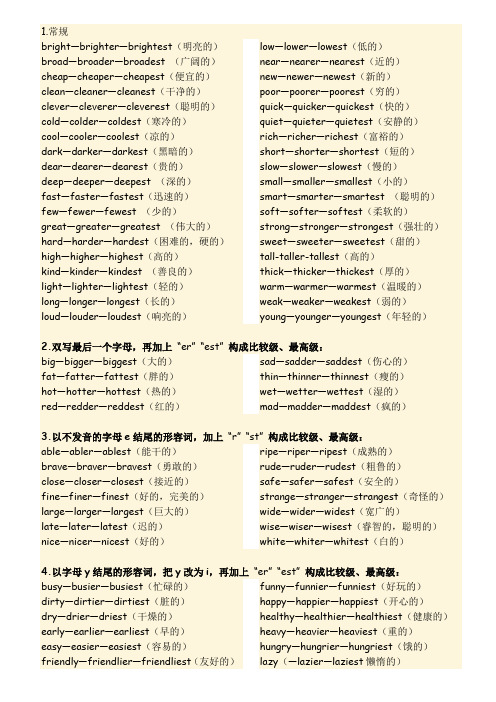
1.常规bright—brighter—brightest(明亮的)broad—broader—broadest (广阔的)cheap—cheaper—cheapest(便宜的)clean—cleaner—cleanest(干净的)clever—cleverer—cleverest(聪明的)cold—colder—coldest(寒冷的)cool—cooler—coolest(凉的)dark—darker—darkest(黑暗的)dear—dearer—dearest(贵的)deep—deeper—deepest (深的)fast—faster—fastest(迅速的)few—fewer—fewest (少的)great—greater—greatest (伟大的)hard—harder—hardest(困难的,硬的)high—higher—highest(高的)kind—kinder—kindest (善良的)light—lighter—lightest(轻的)long—longer—longest(长的)loud—louder—loudest(响亮的)low—lower—lowest(低的)near—nearer—nearest(近的)new—newer—newest(新的)poor—poorer—poorest(穷的)quick—quicker—quickest(快的)quiet—quieter—quietest(安静的)rich—richer—richest(富裕的)short—shorter—shortest(短的)slow—slower—slowest(慢的)small—smaller—smallest(小的)smart—smarter—smartest (聪明的)soft—softer—softest(柔软的)strong—stronger—strongest(强壮的)sweet—sweeter—sweetest(甜的)tall-taller-tallest(高的)thick—thicker—thickest(厚的)warm—warmer—warmest(温暖的)weak—weaker—weakest(弱的)young—younger—youngest(年轻的)2.双写最后一个字母,再加上“er” “est”构成比较级、最高级:big—bigger—biggest(大的)fat—fatter—fattest(胖的)hot—hotter—hottest(热的)red—redder—reddest(红的)sad—sadder—saddest(伤心的)thin—thinner—thinnest(瘦的)wet—wetter—wettest(湿的)mad—madder—maddest(疯的)3.以不发音的字母e结尾的形容词,加上“r” “st” 构成比较级、最高级:able—abler—ablest(能干的)brave—braver—bravest(勇敢的)close—closer—closest(接近的)fine—finer—finest(好的,完美的)large—larger—largest(巨大的)late—later—latest(迟的)nice—nicer—nicest(好的)ripe—riper—ripest(成熟的)rude—ruder—rudest(粗鲁的)safe—safer—safest(安全的)strange—stranger—strangest(奇怪的)wide—wider—widest(宽广的)wise—wiser—wisest(睿智的,聪明的)white—whiter—whitest(白的)4.以字母y结尾的形容词,把y改为i,再加上“er” “est”构成比较级、最高级:busy—busier—busiest(忙碌的)dirty—dirtier—dirtiest(脏的)dry—drier—driest(干燥的)early—earlier—earliest(早的)easy—easier—easiest(容易的)friendly—friendlier—friendliest(友好的)funny—funnier—funniest(好玩的)happy—happier—happiest(开心的)healthy—healthier—healthiest(健康的)heavy—heavier—heaviest(重的)hungry—hungrier—hungriest(饿的)lazy(—lazier—laziest懒惰的)lucky—luckier—luckiest(幸运的)naughty—naughtier—naughtiest(调皮的)noisy—noisier—noisiest(嘈杂的)pretty—prettier—prettiest (美丽的)silly—sillier—silliest(傻的)spicy—spicier—spiciest(辣的)thirsty—thirstier—thirstiest(渴的)ugly—uglier—ugliest(丑的)5.双音节、多音节形容词,在单词前面加上“more” “most”构成比较级、最高级:afraid—more afraid—most afraid(害怕的)beautiful—more beautiful—most beautiful(美丽的)careful—more careful—most careful(仔细的)cheerful—more cheerful—most cheerful(开心的)crowded—more crowded—most crowded(拥挤的)dangerous—more dangerous—most dangerou s(危险的)delicious—more delicious—most delicious(美味的)difficult)—more difficult—most difficult (困难的exciting—more exciting—most exciting(令人兴奋的)expensive—more expensive—most expensive (昂贵的)famous—more famous—most famous(著名的)frightened—more frightened—most frighte ned(受惊的)frightening—more frightening—most fright ening(令人害怕的)hard-working—more hard-working—most har d-working(勤奋的)helpful—more helpful—most helpful(有帮助的)honest—more honest—most honest(诚实的)important—more important—most important (重要的)interesting—more interesting—most interes ting(有趣的)polite—more polite—most polite(有礼貌的)terrible—more terrible—most terrible(可怕的)tired—more tired—most tired(累的)6.不规则变化的形容词:bad—worse—worst(坏的)far—farther—farthest(远的)(Far—further—furthest) good—better—best(好的)ill—worse—worst(病的)little—less—least(少的)many—more—most(多的)much—more—most(多的)old—older—oldest (年老的)( old—elder—eldest) well)—better—best(好的,身体好的。
掌握中的常见比较级和最高级形容词
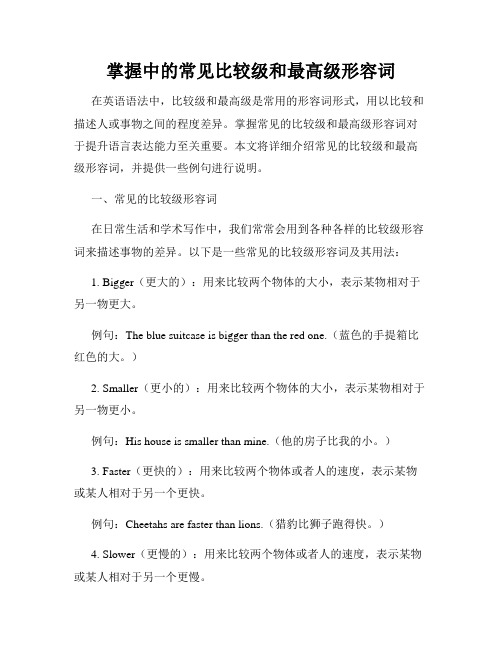
掌握中的常见比较级和最高级形容词在英语语法中,比较级和最高级是常用的形容词形式,用以比较和描述人或事物之间的程度差异。
掌握常见的比较级和最高级形容词对于提升语言表达能力至关重要。
本文将详细介绍常见的比较级和最高级形容词,并提供一些例句进行说明。
一、常见的比较级形容词在日常生活和学术写作中,我们常常会用到各种各样的比较级形容词来描述事物的差异。
以下是一些常见的比较级形容词及其用法:1. Bigger(更大的):用来比较两个物体的大小,表示某物相对于另一物更大。
例句:The blue suitcase is bigger than the red one.(蓝色的手提箱比红色的大。
)2. Smaller(更小的):用来比较两个物体的大小,表示某物相对于另一物更小。
例句:His house is smaller than mine.(他的房子比我的小。
)3. Faster(更快的):用来比较两个物体或者人的速度,表示某物或某人相对于另一个更快。
例句:Cheetahs are faster than lions.(猎豹比狮子跑得快。
)4. Slower(更慢的):用来比较两个物体或者人的速度,表示某物或某人相对于另一个更慢。
例句:The turtle is slower than the rabbit.(乌龟比兔子跑得慢。
)5. Stronger(更强壮的):用来比较两个人或者物体的力量,表示某人或某物相对于另一个更强壮。
例句:He is stronger than his brother.(他比他兄强壮。
)6. Weaker(更弱的):用来比较两个人或者物体的力量,表示某人或某物相对于另一个更弱。
例句:Her immune system is weaker than mine.(她的免疫系统比我的差。
)二、常见的最高级形容词除了比较级形容词,我们也需要了解常见的最高级形容词,用以描述事物之间的最高程度。
常见形容词比较级和最高级

1.常规bright—brighter—brightest(明亮的)broad—broader—broadest (广阔的)cheap—cheaper—cheapest(便宜的)clean—cleaner—cleanest(干净的)clever—cleverer—cleverest(聪明的)cold—colder—coldest(寒冷的)cool—cooler—coolest(凉的)dark—darker—darkest(黑暗的)dear—dearer—dearest(贵的)deep—deeper—deepest (深的)fast—faster—fastest(迅速的)few—fewer—fewest (少的)great—greater—greatest (伟大的)hard—harder—hardest(困难的,硬的)high—higher—highest(高的)kind—kinder—kindest (善良的)light—lighter—lightest(轻的)long—longer—longest(长的)loud—louder—loudest(响亮的)low—lower—lowest(低的)near—nearer—nearest(近的)new—newer—newest(新的)poor—poorer—poorest(穷的)quick—quicker—quickest(快的)quiet—quieter—quietest(安静的)rich—richer—richest(富裕的)short—shorter—shortest(短的)slow—slower—slowest(慢的)small—smaller—smallest(小的)smart—smarter—smartest (聪明的)soft—softer—softest(柔软的)strong—stronger—strongest(强壮的)sweet—sweeter—sweetest(甜的)tall-taller-tallest(高的)thick—thicker—thickest(厚的)warm—warmer—warmest(温暖的)weak—weaker—weakest(弱的)young—younger—youngest(年轻的)2.双写最后一个字母,再加上“er” “est”构成比较级、最高级:big—bigger—biggest(大的)fat—fatter—fattest(胖的)hot—hotter—hottest(热的)red—redder—reddest(红的)sad—sadder—saddest(伤心的)thin—thinner—thinnest(瘦的)wet—wetter—wettest(湿的)mad—madder—maddest(疯的)3.以不发音的字母e结尾的形容词,加上“r” “st” 构成比较级、最高级:able—abler—ablest(能干的)brave—braver—bravest(勇敢的)close—closer—closest(接近的)fine—finer—finest(好的,完美的)large—larger—largest(巨大的)late—later—latest(迟的)nice—nicer—nicest(好的)ripe—riper—ripest(成熟的)rude—ruder—rudest(粗鲁的)safe—safer—safest(安全的)strange—stranger—strangest(奇怪的)wide—wider—widest(宽广的)wise—wiser—wisest(睿智的,聪明的)white—whiter—whitest(白的)4.以字母y结尾的形容词,把y改为i,再加上“er” “est”构成比较级、最高级:busy—busier—busiest(忙碌的)dirty—dirtier—dirtiest(脏的)dry—drier—driest(干燥的)early—earlier—earliest(早的)easy—easier—easiest(容易的)friendly—friendlier—friendliest(友好的)funny—funnier—funniest(好玩的)happy—happier—happiest(开心的)healthy—healthier—healthiest(健康的)heavy—heavier—heaviest(重的)hungry—hungrier—hungriest(饿的)lazy(—lazier—laziest懒惰的)lucky—luckier—luckiest(幸运的)naughty—naughtier—naughtiest(调皮的)noisy—noisier—noisiest(嘈杂的)pretty—prettier—prettiest (美丽的)silly—sillier—silliest(傻的)spicy—spicier—spiciest(辣的)thirsty—thirstier—thirstiest(渴的)ugly—uglier—ugliest(丑的)5.双音节、多音节形容词,在单词前面加上“more” “most”构成比较级、最高级:afraid—more afraid—most afraid(害怕的)beautiful—more beautiful—most beautiful(美丽的)careful—more careful—most careful(仔细的)cheerful—more cheerful—most cheerful(开心的)crowded—more crowded—most crowded(拥挤的)dangerous—more dangerous—most dangerou s(危险的)delicious—more delicious—most delicious(美味的)difficult)—more difficult—most difficult (困难的exciting—more exciting—most exciting(令人兴奋的)expensive—more expensive—most expensive (昂贵的)famous—more famous—most famous(著名的)frightened—more frightened—most frighte ned(受惊的)frightening—more frightening—most fright ening(令人害怕的)hard-working—more hard-working—most har d-working(勤奋的)helpful—more helpful—most helpful(有帮助的)honest—more honest—most honest(诚实的)important—more important—most important (重要的)interesting—more interesting—most interes ting(有趣的)polite—more polite—most polite(有礼貌的)terrible—more terrible—most terrible(可怕的)tired—more tired—most tired(累的)6.不规则变化的形容词:bad—worse—worst(坏的)far—farther—farthest(远的)(Far—further—furthest) good—better—best(好的)ill—worse—worst(病的)little—less—least(少的)many—more—most(多的)much—more—most(多的)old—older—oldest (年老的)( old—elder—eldest) well)—better—best(好的,身体好的。
常用形容词及比较级
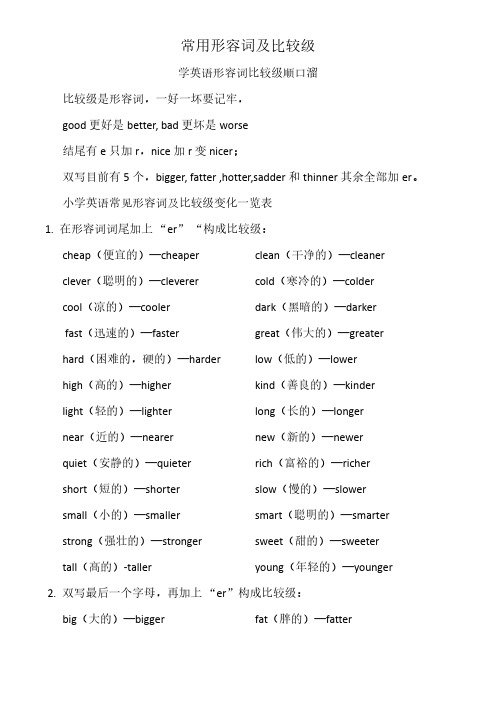
学英语形容词比较级顺口溜比较级是形容词,一好一坏要记牢,good更好是better,bad更坏是worse结尾有e只加r,nice加r变nicer;双写目前有5个,bigger,fatter,hotter,sadder和thinner其余全部加er。
小学英语常见形容词及比较级变化一览表1.在形容词词尾加上“er”“构成比较级:cheap(便宜的)—cheaper clean(干净的)—cleanerclever(聪明的)—cleverer cold(寒冷的)—coldercool(凉的)—cooler dark(黑暗的)—darkerfast(迅速的)—faster great(伟大的)—greaterhard(困难的,硬的)—harder low(低的)—lowerhigh(高的)—higher kind(善良的)—kinderlight(轻的)—lighter long(长的)—longernear(近的)—nearer new(新的)—newerquiet(安静的)—quieter rich(富裕的)—richershort(短的)—shorter slow(慢的)—slowersmall(小的)—smaller smart(聪明的)—smarterstrong(强壮的)—stronger sweet(甜的)—sweetertall(高的)-taller young(年轻的)—younger2.双写最后一个字母,再加上“er”构成比较级:big(大的)—bigger fat(胖的)—fatterhot(热的)—hotter sad(伤心的)—sadderthin(瘦的)—thinner3.以不发音的字母e结尾的形容词,加上“r”构成比较级:close(接近的)—closer fine(好的,完美的)—finer large(巨大的)—larger late(迟的)—laternice(好的)—nicer white(白的)—whiter4.以字母y结尾的形容词,把y改为i,再加上“er”构成比较级:busy(忙碌的)—busier dirty(脏的)—dirtierearly(早的)—earlier easy(容易的)—easierfriendly(友好的)—friendlier pretty(美丽的)—prettier funny(好玩的)—funnier happy(开心的)—happier healthy(健康的)—healthier heavy(重的)—heavierhungry(饿的)—hungrier lazy(懒惰的)—lazierlucky(幸运的)—luckier noisy(嘈杂的)—noisier 5.双音节、多音节形容词,在单词前面加上“more”构成比较级:afraid(害怕的)—more afraidbeautiful(美丽的)—more beautifulcareful(仔细的)—more carefuldelicious(美味的)—more deliciousexciting(令人兴奋的)—more excitingexpensive(昂贵的)—more expensivefamous(著名的)—more famoushard-working(勤奋的)—more hard-workinghelpful(有帮助的)—more helpfulinteresting(有趣的)—more interestingpolite(有礼貌的)—more politetired(累的)—more tired6.不规则变化的形容词:bad(坏的)—worse far(远的)—farthergood(好的)—better ill(病的)—worselittle(少的)—less many(多的)—moremuch(多的)—more well(好的,身体好的)—better old(年老的)—older(elder)。
英语语法 比较级有哪些常见的例子

英语语法比较级有哪些常见的例子比较级是英语语法中用来比较两个事物或概念之间的程度、数量或质量差异的形式。
它通常用于句子中的形容词和副词,以表达更高或更低的程度。
比较级可以帮助我们进行比较、对比和描述。
比较级的形式是在形容词或副词前加上"-er"字尾,或者在前面加上"more"。
下面是一些常见的比较级的例子:1. 形容词比较级的例子:- big(大)→ bigger(更大的)- small(小)→ smaller(更小的)- tall(高)→ taller(更高的)- fast(快)→ faster(更快的)- slow(慢)→ slower(更慢的)2. 副词比较级的例子:- quickly(快速地)→ more quickly(更快地)- slowly(慢慢地)→ more slowly(更慢地)- loudly(大声地)→ more loudly(更大声地)- softly(轻轻地)→ more softly(更轻轻地)- easily(容易地)→ more easily(更容易地)需要注意的是,有一些形容词和副词的比较级形式是不规则的,需要记住它们的特殊形式。
例如:- good(好)→ better(更好的)- bad(坏)→ worse(更糟糕的)- little(少)→ less(更少的)比较级在句子中的作用是帮助我们表达两个事物之间的差异,指出一个事物相对于另一个事物在某个方面更高或更低的程度。
通过使用比较级,我们可以更准确地描述事物的特点、评估选项之间的优劣,并进行比较和对比。
比较级还可以用来表达递增或递减的趋势,或者描述随时间、空间或数量的变化。
总之,比较级在英语语法中是一个重要的概念,它帮助我们描述和比较事物之间的差异,使我们的语言更具准确性和表达力。
小学英语常见形容词及比较级、最高级变化一览表

小学英语常见形容词及比较级、最高级变化一览表1.在形容词词尾加上“er”bright (明亮的)一^brighter—brightest cheap (便宜的)一cheaper—cheapes clever (聪明的)一cleverer—cleverest cool(凉的)一cooler-coolest dear (贵的)一dearer—dearest fast (迅速的)一faster—fastest grea(伟大的)一greater—greatest high (高的)一higher—highest light (轻的)一lighter—lightest loud (响亮的)一louder—loudest near (近的)一nearer—nearest poor (穷的)一poorer-poorest quiet (安静的)一quieter—quietest short (短的)一shorter—shortest small (小的)一^smaller—smallestbroad (广阔的)一^broader-broadest clean (干净的)一cleaner—cleanestcold (寒冷的)一colder—coldest dark (黑暗的)一darker—darkest deep (深的)一deeper—deepest few (少的)一fewer—fewest hard(困难的硬的)一harder—hardest kind (善良的)一kinder—kindest long (长的)一longer—longestlow (低的)一lower-lowest new (新的)一newer—newest quick (快的)一quicker—quickest“est”构成比较级、最高级:rich (富裕的)一richer—richest slow (慢的)一slower—slowestsmart (聪明的)一smarter-smarteststrong (强壮的)一stronger—strongestsweet (甜的)一sweeter-sweetest thick (厚的)一thicker—thickest weak(弱的)一weaker-weakest2.双写最后一个字母,再加上“er”big (大的)一bigger-biggesthot (热的)一hotter—hottest sad (伤心的)一sadder—saddest wet (湿的)一wetter—wettesttall (高的)-taller-tallestwarm (温暖的)一warmer—warmestyoung(年轻的)一younger—youngestfat (胖的)一fatter—fattestred (红的)一redder-reddest thin (瘦的)一thinner—thinnest mad (疯的)一madder—maddest3息不发音的字母❷结尾的形容词,加上“r” “st”构成比较级、最高级:able (能干的)一abler—ablest close (接近的)一closer—closest large (巨大的)一larger—largest nice (好的)一nicer—nicest rude(粗鲁的)一ruder—rudest brave (勇敢的)一braver—bravestfine (好的,完美的)一finer—finestlate (迟的)一later—latest ripe (成熟的)一riper—ripest safe (安全的)一safer—safestsoft (柔软的)一softer—softest“est”构成比较级、最高级:strange (奇怪的)一stranger—strangest wide (宽广的)一wider-widest wise (睿智的,聪明的)一wiser—wisest white (白的)一whiter—whitest4.以字母丫结尾的形容词,把丫改为「再加上“er” “est”构成比较级、最高级:busy (忙碌的)一busier—busiest dirty (脏的)一dirtier—dirtiest dry (干燥的)一drier—driest early (早的)一earlier—earliest easy(容易的)一easier—easiest friendly(友好的)一friendlier—friendliestfunny (好玩的)一funnier—funniest appy (开心的)一happier—happiesthealthy (健康的)一healthier—healthiest heavy (重的)一heavier—heaviesthungry (饿的)一hungrier—hungriest lazy (懒惰的)一lazier-laziest luck(幸运的)一luckier-luckiest naught(调皮的)-naughtier—naughtiest noisy (嘈杂的)一noisier—noisiest pretty (美丽的)一prettier—prettiest silly (傻的)一sillier-silliest spicy (辣的)一spicier-spiciestthirsty (渴的)一thirstier—thirstiest ugly (丑的)一uglier—ugliest“most” 构成比较级、最高5.双音节、多音节形容词,在单词前面加上“more级:afraid (害怕的)一more afraid—most afraidbeautiful(美丽的)一more beautiful—most beautifulcareful(E细的)一more careful—most carefulcheerful(开心的)一more cheerful—most cheerfulcrowded (拥挤的)一more crowded—most crowdeddangerous (危险的)一more dangerous—most dangerousdelicious (美味的)一more delicious—most deliciousdifficult (困难的)一more difficult—most difficultexciting (令人兴奋的)一more exciting—most excitingexpensive (昂贵的)一more expensive—most expensivefamous (著名的)一more famous—most famousfrightened (受惊的)一more frightened—most frightened frightening (令人害怕的)一more frightening—most frightening hard-working (勤奋的)一more hard-working—most hard-working helpful(有帮助的)一more helpful—most helpfulhonest (诚实的)一more honest—most honest important (重要的)一more important—most importantpolite (有礼貌的)一more polite —most polite terrible (可怕的)一more terrible —most terrible tired (累的)一more tired —most tiredold (年老的)一older-oldest ( old —elder —eldest ) well (好的,身体好的)一better —best形容词、副词的比较级和最高级的句子公式 物体 A + am / are / is + 形比 + than + 物体 B.I am taller than you.Pasta is more delicious than pizza.物体A + am / are / is + the +形最高级+比较范围(of +人/物,e+地方).6.不规则变化的形容词:bad (坏的)一worse —worstfurther —furthest ) good (好的)一better —bestlittle (少的)一less —leastfar (远的)一farther —farthest (far —ill (病的)一worse-worstI am the tallest in the class.Pasta is the most delicious food of the three.副词物体A +行为动词+副比+ than +物体B.He studies better than me.物体A +行为动词+副词最高级+比较范围(of +人/物,e+地方). He studies best of us.。
常见形容词的比较级和最高级有哪些
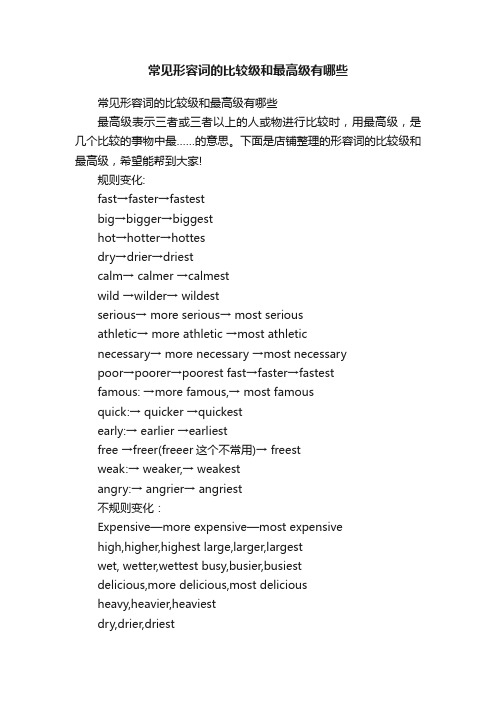
常见形容词的比较级和最高级有哪些常见形容词的比较级和最高级有哪些最高级表示三者或三者以上的人或物进行比较时,用最高级,是几个比较的事物中最……的意思。
下面是店铺整理的形容词的比较级和最高级,希望能帮到大家!规则变化:fast→faster→fastestbig→bigger→biggesthot→hotter→hottesdry→drier→driestcalm→ calmer →calmestwild →wilder→ wildestserious→ more serious→ most seriousathletic→ more athletic →most athleticnecessary→ more necessary →most necessarypoor→poorer→poorest fast→faster→fastestfamous: →more famous,→ most famousquick:→ quicker →qu ickestearly:→ earlier →earliestfree →freer(freeer这个不常用)→ freestweak:→ weaker,→ weakestangry:→ angrier→ angriest不规则变化:Expensive—more expensive—most expensivehigh,higher,highest large,larger,largestwet, wetter,wettest busy,busier,busiestdelicious,more delicious,most deliciousheavy,heavier,heaviestdry,drier,driesteasy easier easiestlazy lazier laziestpretty prettier prettiestnaughty naughtier naughtiestmealy mealier mealiestearly earlier earliestthirsty thirstier thirstiestfar→farther→farthestfar→further→furthestDull—duller--dullestLoud-louder--loudestBoring—more boring—most boringCreative—more creative—most creativeWarm---warmer--warmestgood / well→better→bestbad / ill→worse→worstmany / much→more→mostlittle→less→leastlate→later→ / latestlate→latter→last【拓展】关于形容词和副词的比较级一、含义1. 大多数形容词和副词有三个等级:原级、比较级、最高级: good – better - best2. 比较级:表示两者(人或物)之间的比较。
(完整版)英语单词比较级
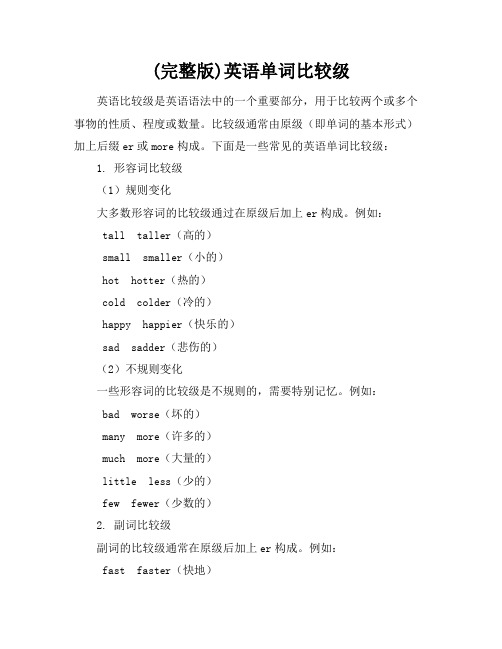
(完整版)英语单词比较级英语比较级是英语语法中的一个重要部分,用于比较两个或多个事物的性质、程度或数量。
比较级通常由原级(即单词的基本形式)加上后缀er或more构成。
下面是一些常见的英语单词比较级:1. 形容词比较级(1)规则变化大多数形容词的比较级通过在原级后加上er构成。
例如:tall taller(高的)small smaller(小的)hot hotter(热的)cold colder(冷的)happy happier(快乐的)sad sadder(悲伤的)(2)不规则变化一些形容词的比较级是不规则的,需要特别记忆。
例如:bad worse(坏的)many more(许多的)much more(大量的)little less(少的)few fewer(少数的)2. 副词比较级副词的比较级通常在原级后加上er构成。
例如:fast faster(快地)slowly more slowly(慢地)carefully more carefully(仔细地)well better(好地)badly worse(坏地)3. 比较级的用法(1)形容词和副词的比较级通常与than连用,构成比较句。
例如:He is taller than me.(他比我高。
)She runs faster than him.(她比他跑得快。
)(2)在比较级前可以使用一些修饰词,如a little, much, far 等,表示比较的程度。
例如:This book is a little more interesting than that one.(这本书比那本更有趣。
)She sings much better than her sister.(她唱歌比她姐姐唱得好多了。
)She is the tallest girl in our class.(她是我们班最高的女孩。
)He runs the fastest in our school.(他是我们学校跑得最快的。
英语常见形容词及比较级、最高级变化一览表
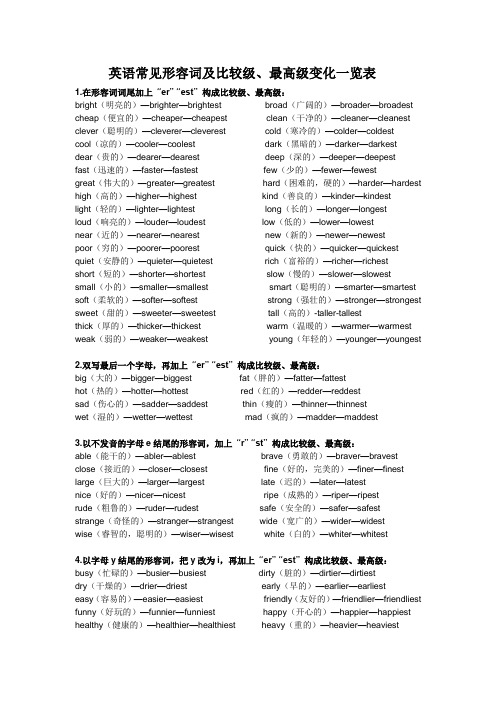
英语常见形容词及比较级、最高级变化一览表1.在形容词词尾加上“er” “est” 构成比较级、最高级:bright(明亮的)—brighter—brightest broad(广阔的)—broader—broadest cheap(便宜的)—cheaper—cheapest clean(干净的)—cleaner—cleanest clever(聪明的)—cleverer—cleverest cold(寒冷的)—colder—coldestcool(凉的)—cooler—coolest dark(黑暗的)—darker—darkestdear(贵的)—dearer—dearest deep(深的)—deeper—deepestfast(迅速的)—faster—fastest few(少的)—fewer—fewestgreat(伟大的)—greater—greatest hard(困难的,硬的)—harder—hardest high(高的)—higher—highest kind(善良的)—kinder—kindestlight(轻的)—lighter—lightest long(长的)—longer—longestloud(响亮的)—louder—loudest low(低的)—lower—lowestnear(近的)—nearer—nearest new(新的)—newer—newestpoor(穷的)—poorer—poorest quick(快的)—quicker—quickest quiet(安静的)—quieter—quietest rich(富裕的)—richer—richestshort(短的)—shorter—shortest slow(慢的)—slower—slowestsmall(小的)—smaller—smallest smart(聪明的)—smarter—smartest soft(柔软的)—softer—softest strong(强壮的)—stronger—strongest sweet(甜的)—sweeter—sweetest tall(高的)-taller-tallestthick(厚的)—thicker—thickest warm(温暖的)—warmer—warmest weak(弱的)—weaker—weakest young(年轻的)—younger—youngest2.双写最后一个字母,再加上“er” “est” 构成比较级、最高级:big(大的)—bigger—biggest fat(胖的)—fatter—fattesthot(热的)—hotter—hottest red(红的)—redder—reddestsad(伤心的)—sadder—saddest thin(瘦的)—thinner—thinnestwet(湿的)—wetter—wettest mad(疯的)—madder—maddest3.以不发音的字母e结尾的形容词,加上“r” “st” 构成比较级、最高级:able(能干的)—abler—ablest brave(勇敢的)—braver—bravest close(接近的)—closer—closest fine(好的,完美的)—finer—finest large(巨大的)—larger—largest late(迟的)—later—latestnice(好的)—nicer—nicest ripe(成熟的)—riper—ripestrude(粗鲁的)—ruder—rudest safe(安全的)—safer—safeststrange(奇怪的)—stranger—strangest wide(宽广的)—wider—widestwise(睿智的,聪明的)—wiser—wisest white(白的)—whiter—whitest4.以字母y结尾的形容词,把y改为i,再加上“er” “est” 构成比较级、最高级:busy(忙碌的)—busier—busiest dirty(脏的)—dirtier—dirtiestdry(干燥的)—drier—driest early(早的)—earlier—earliesteasy(容易的)—easier—easiest friendly(友好的)—friendlier—friendliest funny(好玩的)—funnier—funniest happy(开心的)—happier—happiest healthy(健康的)—healthier—healthiest heavy(重的)—heavier—heaviesthungry(饿的)—hungrier—hungriest lazy(懒惰的)—lazier—laziestlucky(幸运的)—luckier—luckiest naughty(调皮的)—naughtier—naughtiest noisy(嘈杂的)—noisier—noisiest pretty(美丽的)—prettier—prettiest silly(傻的)—sillier—silliest spicy(辣的)—spicier—spiciestthirsty(渴的)—thirstier—thirstiest ugly(丑的)—uglier—ugliest5.双音节、多音节形容词,在单词前面加上“more” “most” 构成比较级、最高级:afraid(害怕的)—more afraid—most afraidbeautiful(美丽的)—more beautiful—most beautifulcareful(仔细的)—more careful—most carefulcheerful(开心的)—more cheerful—most cheerfulcrowded(拥挤的)—more crowded—most crowdeddangerous(危险的)—more dangerous—most dangerousdelicious(美味的)—more delicious—most deliciousdifficult(困难的)—more difficult—most difficultexciting(令人兴奋的)—more exciting—most excitingexpensive(昂贵的)—more expensive—most expensivefamous(著名的)—more famous—most famousfrightened(受惊的)—more frightened—most frightenedfrightening(令人害怕的)—more frightening—most frighteninghard-working(勤奋的)—more hard-working—most hard-workinghelpful(有帮助的)—more helpful—most helpfulhonest(诚实的)—more honest—most honestimportant(重要的)—more important—most importantinteresting(有趣的)—more interesting—most interestingpolite(有礼貌的)—more polite—most politeterrible(可怕的)—more terrible—most terribletired(累的)—more tired—most tired6.不规则变化的形容词:bad(坏的)—worse—worstfar(远的)—farther—farthest (far—further—furthest)good(好的)—better—bestill(病的)—worse—worstlittle(少的)—less—leastmany(多的)—more—mostmuch(多的)—more—mostold(年老的)—older—oldest ( old—elder—eldest)well(好的,身体好的)—better—best。
形容词的比较级与最高级的例词

形容词的比较级与最高级的例词形容词是用来描述人、事物、情感和行为特征的词语,而形容词的比较级和最高级则是用来对不同事物或人的特征进行比较和排序。
在英语中,形容词的比较级和最高级有一定的构造规则和用法。
下面将以几个常见的形容词为例,详细介绍形容词的比较级和最高级。
1. Tall(高):- 比较级:taller(更高的)- 最高级:tallest(最高的)举例:- My brother is taller than me.(我的哥哥比我高)- John is the tallest student in our class.(约翰是我们班最高的学生)2. Bright(明亮的):- 比较级:brighter(更明亮的)- 最高级:brightest(最明亮的)举例:- The sun is brighter than the moon.(太阳比月亮更明亮)- This room has the brightest light.(这个房间有最亮的光线)3. Fast(快的):- 比较级:faster(更快的)- 最高级:fastest(最快的)举例:- The cheetah is faster than any other animal.(猎豹是比其他动物都更快的)- Usain Bolt is the fastest sprinter in the world.(尤塞恩·博尔特是世界上最快的短跑运动员)4. Delicious(美味的):- 比较级:more delicious(更美味的)- 最高级:most delicious(最美味的)举例:- The cake is more delicious than the cookies.(蛋糕比饼干更美味)- This restaurant serves the most delicious food in town.(这家餐厅提供镇上最美味的食物)5. Interesting(有趣的):- 比较级:more interesting(更有趣的)- 最高级:most interesting(最有趣的)举例:- The book is more interesting than the movie.(这本书比电影更有趣)- The history museum was the most interesting place we visited.(历史博物馆是我们参观的最有趣的地方)通过上述例子,我们可以看到形容词的比较级和最高级的构造方式。
英语中的形容词有哪些比较级和最高级

英语中的形容词有哪些比较级和最高级?英语中的形容词比较级和最高级通常是通过在形容词前加上不同的前缀来构成的。
以下是常见的形容词比较级和最高级形式:1. 一般形式:形容词的原级(Positive Degree)是形容词的基本形式,用于描述事物的基本特征。
例如:big(大)、beautiful(美丽)、fast(快)等。
2. 比较级(Comparative Degree):用于比较两个事物的性质、大小、品质等。
形成比较级的一般规则是在形容词前加上"-er"或者在形容词前加上"more"。
例如:- big(大)- bigger(更大)- beautiful(美丽)- more beautiful(更美丽)- fast(快)- faster(更快)3. 最高级(Superlative Degree):用于比较三个或更多事物之间的性质、大小、品质等,表示最高程度。
形成最高级的一般规则是在形容词前加上"-est"或者在形容词前加上"most"。
例如:- big(大)- biggest(最大)- beautiful(美丽)- most beautiful(最美丽)- fast(快)- fastest(最快)需要注意的是,有些形容词的比较级和最高级形式是不规则的,需要记住其特殊形式。
例如:- good(好)- better(更好)- best(最好)- bad(坏)- worse(更坏)- worst(最坏)- much(多)- more(更多)- most(最多)以上是英语中常见的形容词比较级和最高级形式。
掌握这些形式可以帮助我们在表达时更准确地描述事物的特征和进行比较。
英语形容词分类六种
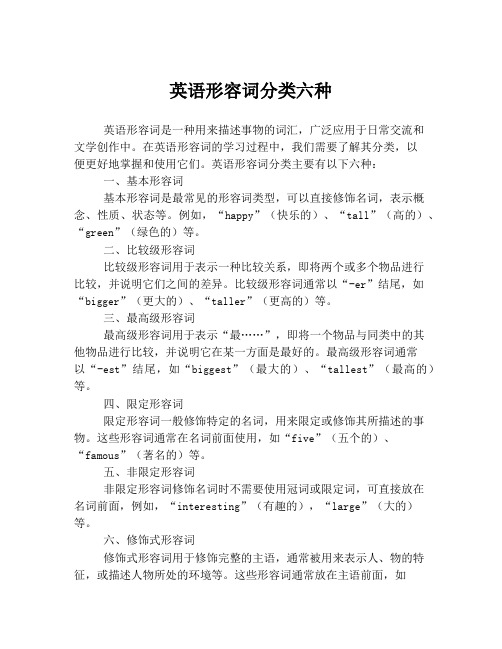
英语形容词分类六种英语形容词是一种用来描述事物的词汇,广泛应用于日常交流和文学创作中。
在英语形容词的学习过程中,我们需要了解其分类,以便更好地掌握和使用它们。
英语形容词分类主要有以下六种:一、基本形容词基本形容词是最常见的形容词类型,可以直接修饰名词,表示概念、性质、状态等。
例如,“happy”(快乐的)、“tall”(高的)、“green”(绿色的)等。
二、比较级形容词比较级形容词用于表示一种比较关系,即将两个或多个物品进行比较,并说明它们之间的差异。
比较级形容词通常以“-er”结尾,如“bigger”(更大的)、“taller”(更高的)等。
三、最高级形容词最高级形容词用于表示“最……”,即将一个物品与同类中的其他物品进行比较,并说明它在某一方面是最好的。
最高级形容词通常以“-est”结尾,如“biggest”(最大的)、“tallest”(最高的)等。
四、限定形容词限定形容词一般修饰特定的名词,用来限定或修饰其所描述的事物。
这些形容词通常在名词前面使用,如“five”(五个的)、“famous”(著名的)等。
五、非限定形容词非限定形容词修饰名词时不需要使用冠词或限定词,可直接放在名词前面,例如,“interesting”(有趣的),“large”(大的)等。
六、修饰式形容词修饰式形容词用于修饰完整的主语,通常被用来表示人、物的特征,或描述人物所处的环境等。
这些形容词通常放在主语前面,如“happy”(快乐的),“tall”(高的)等。
总之,英语形容词的分类非常丰富多样,对于学习和使用英语来说,了解各种形容词类型是非常重要的。
通过学习这些形容词类型,我们可以更准确地表达自己的意思,使我们的语言更加生动活泼。
形容词比较级大全总结
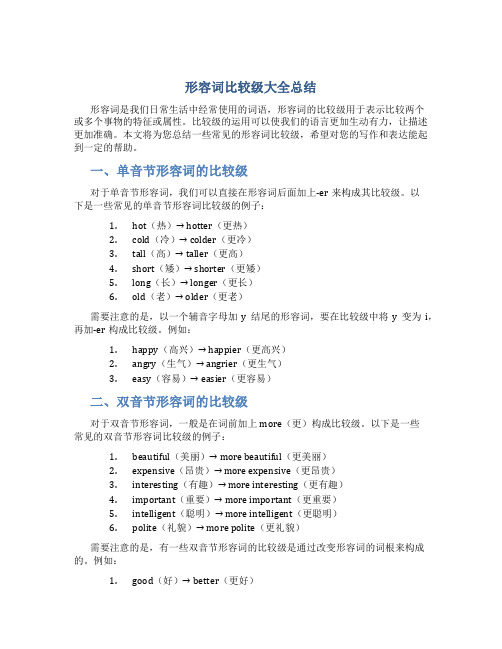
形容词比较级大全总结形容词是我们日常生活中经常使用的词语,形容词的比较级用于表示比较两个或多个事物的特征或属性。
比较级的运用可以使我们的语言更加生动有力,让描述更加准确。
本文将为您总结一些常见的形容词比较级,希望对您的写作和表达能起到一定的帮助。
一、单音节形容词的比较级对于单音节形容词,我们可以直接在形容词后面加上-er来构成其比较级。
以下是一些常见的单音节形容词比较级的例子:1.hot(热)→ hotter(更热)2.cold(冷)→ colder(更冷)3.tall(高)→ taller(更高)4.short(矮)→ shorter(更矮)5.long(长)→ longer(更长)6.old(老)→ older(更老)需要注意的是,以一个辅音字母加y结尾的形容词,要在比较级中将y变为i,再加-er构成比较级。
例如:1.happy(高兴)→ happier(更高兴)2.angry(生气)→ angrier(更生气)3.easy(容易)→ easier(更容易)二、双音节形容词的比较级对于双音节形容词,一般是在词前加上more(更)构成比较级。
以下是一些常见的双音节形容词比较级的例子:1.beautiful(美丽)→ more beautiful(更美丽)2.expensive(昂贵)→ more expensive(更昂贵)3.interesting(有趣)→ more interesting(更有趣)4.important(重要)→ more important(更重要)5.intelligent(聪明)→ more intelligent(更聪明)6.polite(礼貌)→ more polite(更礼貌)需要注意的是,有一些双音节形容词的比较级是通过改变形容词的词根来构成的。
例如:1.good(好)→ better(更好)2.bad(坏)→ worse(更坏)3.little(小)→ less(更小)三、三音节及以上形容词的比较级对于三音节及以上的形容词,一般也是在词前加上more(更)构成比较级,或者通过改变形容词的词根来构成比较级。
英语常见形容词及比较级最高级变化一览表

形容词第一章比较级、最高级变化一览表规则变化1.单音节以及少数双音节的词尾加上“er”“est”构成比较级、最高级:bright明亮的—brighter—brightest broad广阔的—broader—broadestcheap便宜的—cheaper—cheapest clean干净的—cleaner—cleanest clever聪明的—cleverer—cleverest cold寒冷的—colder—coldestcool凉的—cooler—coolest dark黑暗的—darker—darkestdear贵的—dearer—dearest deep深的—deeper—deepestfast迅速的—faster—fastest few少的—fewer—fewestgreat伟大的—greater—greatest hard困难的,硬的—harder—hardesthigh高的—higher—highest kind善良的—kinder—kindestlight轻的—lighter—lightest long长的—longer—longestloud响亮的—louder—loudest low低的—lower—lowestnear近的—nearer—nearest new新的—newer—newestpoor穷的—poorer—poorest quick快的—quicker—quickestquiet安静的—quieter—quietest rich富裕的—richer—richestshort短的—shorter—shortest slow慢的—slower—slowestsmall小的—smaller—smallest smart聪明的—smarter—smartestsoft柔软的—softer—softest strong强壮的—stronger—strongest sweet甜的—sweeter—sweetest tall高的-taller - tallest thick厚的—thicker—thickest warm温暖的—warmer—warmestweak弱的—weaker—weakest young年轻的—younger—youngest2以一个元音加一个辅音字母结尾的单音节词即重读闭音节词,双写结尾的辅音字母er,-estbig大的—bigger—biggest fat胖的—fatter—fattesthot热的—hotter—hottest red红的—redder—reddestsad伤心的—sadder—saddest thin瘦的—thinner—thinnestwet湿的—wetter—wettest mad疯的—madder—maddest特别提醒:new, few, slow, clean等词含有字母组合,且发的是长元音,不用双写;3.以不发音的字母e结尾的形容词,加上“r”“st”构成比较级、最高级:able能干的—abler—ablest brave勇敢的—braver—bravestclose接近的—closer—closest fine好的,完美的—finer—finestlarge巨大的—larger—largest late迟的—later—latest nice好的—nicer—nicest ripe成熟的—riper—ripestrude粗鲁的—ruder—rudest safe安全的—safer—safest strange奇怪的—stranger—strangest wide宽广的—wider—widestwise睿智的,聪明的—wiser—wisest white白的—whiter—whitest4.“以辅音字母+y”结尾的词改y为i,再加-er, -estbusy忙碌的—busier—busiest dirty脏的—dirtier—dirtiest dry干燥的—drier—driest early早的—earlier—earliesteasy容易的—easier—easiest friendly友好的—friendlier—friendliest funny好玩的—funnier—funniest happy开心的—happier—happiest healthy健康的—healthier—healthiest heavy重的—heavier—heaviest hungry饿的—hungrier—hungriest lazy懒惰的—lazier—laziestlucky幸运的—luckier—luckiest naughty调皮的—naughtier—naughtiest noisy嘈杂的—noisier—noisiest pretty美丽的—prettier—prettiestsilly傻的—sillier—silliest spicy辣的—spicier—spiciest thirsty渴的—thirstier—thirstiest ugly丑的—uglier—ugliest5.双音节、多音节形容词即音标中含有三个或三个以上元音音素的词,在单词前面加上“more”“most”构成比较级、最高级:afraid害怕的—more afraid—most afraidbeautiful美丽的—more beautiful—most beautifulcareful仔细的—more careful—most carefulcheerful开心的—more cheerful—most cheerfulcrowded拥挤的—more crowded—most crowdeddangerous危险的—more dangerous—most dangerousdelicious美味的—more delicious—most deliciousdifficult困难的—more difficult—most difficultexciting令人兴奋的—more exciting—most excitingexpensive昂贵的—more expensive—most expensivefamous着名的—more famous—most famousfrightened受惊的—more frightened—most frightenedfrightening令人害怕的—more frightening—most frighteninghard-working勤奋的—more hard-working—most hard-workinghelpful有帮助的—more helpful—most helpfulhonest诚实的—more honest—most honestimportant重要的—more important—most importantinteresting有趣的—more interesting—most interestingpolite有礼貌的—more polite—most politeterrible可怕的—more terrible—most terribletired累的—more tired—most tired特别提醒:以形容前缀un构成的三音节形容词不适合上述情况,如:unhappy-unhappier-unhappiest, untidy-untidier-untidiest6. 以形容词+ly构成的副词要在前面加 more,mostSlowly-more slowly-most slowly quickly-more quickly-most quickly特别提醒:early -earlier-earliest7. 由ing分词和-ed分词演变过来的形容词包括不规则动词如know→known只能加more或most来表示它们的比较级和最高级;interesting- more interesting -most interestingexcited- more excited- most excitingtired- more tired - mosttiredboring-more boring-most boring不规则变化bad坏的—worse—worstfar远的—farther—farthest far—further—furthestgood好的—better—bestill病的—worse—worstlittle少的—less—leastmany多的—more—mostmuch多的—more—mostold年老的—older—oldest old—elder—eldestwell好的,身体好的—better—best特别提醒:◇further不仅可以指“距离更远”,还可指“程度更深”;记住以下三个词组:further study 进修further education继续教育further information 进一步的信息◇elder仅用于同辈之间的排行,如: elder sister姐姐 elder brother 哥哥◇less作为“更少”仅用来修饰不可数名词,修饰可数名词表示“更少”要用fewer;第二章形容词副词比较级较难考点◇少数单音节词前面加 more, most 构成比较级和最高级,这类形容词一般为表语形容词和由过去分词变成的形容词afraid -more afraid, most afraid tired - more tired , most tiredfond - more fond , most fond glad -more glad , most gladbored - more bored , most bored pleased---- more pleased , most pleased ◇下列形容词和副词的比较级和最高级有两种形式,即:既可加-er/-est也可加more/most strict, often, friendly, clever◇下列形容词和副词没有比较级和最高即表示“最高程度”或“绝对状态”的形容词和副词没有比较级和最高级如:empty, wrong, perfect, unique, extreme, excellent, favourite, true, right, correct, extremely ...◇比较应在同类事物之间进行;误:Your English is better than me.正:Your English is better than mine.◇比较级前可以有一个表示程度的状语,最常见的三大修饰词是:a little, much, even; 以下单词也可用来修饰:any, far, still, a lot, yet, rather;My sister is a little taller than me.Their house is much larger than ours.另外,名词短语也可修饰比较级,说明程度;I’m three years older than he.特别提醒:very, quite, too不可修饰比较级;◇避免重复使用比较级;误:He is more kinder to small animals than I.正:He is much kinder to small animals than I.误:He is more cleverer than his brother.正:He is cleverer than his brother.◇比较要符合逻辑,在同一范围内比较时,避免将主语含在比较对象中,这时需使用other来排除自身;误:China is larger that any country in Asia.正:China is larger than any other country in Asia.误:John studies harder than any student in his class.正:John studies harder than any other student in his class.正:John studies harder than any of the other students in his class.正:John studies harder than anyone else in his class.◇比较要遵循前后一致的原则,注意前后呼应;The population of Shanghai is larger than that of Beijing.It is easier to make a plan than to carry it out.◇序数词通常只修饰最高级;Africa is the second largest continent.The Yellow River is the second longest river in China.This is the third most popular song of Michael Jackson.◇为避免重复,我们通常用that, those, one, ones代替前面出现的名词;that代替可数名词单数和不可数名词,those代替可数名词复数;one既可指人又可指物,只能代替可数名词; The weather in China is different from that in America.The book on the table is more interesting than that或the oneon the desk.A box made of steel is stronger than one made of wood.误:In winter, the weather of Beijing is colder than it of Shanghai.正:In winter, the weather of Beijing is colder than that of Shanghai.◇“否定词 + 比较级”相当于最高级;----Wait until we get a satisfactory reply, will you----I couldn't agree more. The idea sounds great to me.Nothing is so easy as this. =Nothing is easier than this. =This is the easiest thing. ◇比较级前一般不加冠词;但表示两者中较突出者,且比较级后又有名词或出现了of the two,这时比较级前一定要加the;He is the taller of the two.Of the two jobs,he chose the harder.Which is the younger one, Lily or Lucy试比较:Which is larger, Canada or AustraliaWhich is the larger country, Canada or AustraliaShe is taller than her two sisters.She is the taller of the two sisters.◇不含than 的比较级前可加不定冠词修饰,构成“a/an+比较级+单数可数名词”表示“一个更……的人/物”;Why don’t you use a sharper knife 你为什么不用一把更锋利的刀呢◇比较级than 后应用人称代词的主格,但非正式语体中常用宾格;He is taller than I/me.◇为避免重复,比较级中同样的动词用助动词do, does, did替代;I spend less time doing homework than John does.She tells more funny jokes than we do.以下内容不是初中教学的重点,仅供拓展之用;◇形容词most前面没有the,不表示最高级的含义,只表示“非常”;It is a most important problem.=It is a very important problem.◇倍数表达法▲A is threefour, etc.times the sizeheight, length etc.of B.The new building is four times the sizethe heightof the old one.这座新楼是那座旧楼的四倍大高/这座新楼比那座旧楼大高三倍;▲A is threefour, etc.times as bighigh, long, etc.as B.Asia is four times as large as Europe. 亚洲是欧洲的四倍大/亚洲比欧洲大三倍;▲A is three four, etc.times biggerhigher, longer, etc.than B.Your school is three times bigger than ours.你们的学校比我们的学校大三倍;用times 表倍数通常用于三倍以上,两倍可以用twice或double.第三章形容词副词比较级最高级重点句型归纳◇句型一:形容词或副词比较级+than…□注意事项:该句型为比较级的最基本句型;只要看到than,即可确定前面使用比较级;He is taller than I am.The boy does his homework more carefully than the girl.◇句型二:less + 形容词的原级 + than□注意事项:该句型表示“不如、不及”,特别需要注意的是,less本身就是little的比较级,后面必须跟形容词的原级,否定就造成了比较级的重复使用;This computer is less expensive than that one.◇句型三:as +形容词或副词的原级+ as□注意事项:该句型表示对比的两者程度相当,as之间必须跟形容词或副词的原级,决不能使用比较级;此外,还要确定使用形容词还是副词;确定的依据就是根据第一个as前的动词,如果是系动词如be,感官动词look, sound, smell, taste, feel等,那么就用形容词的原级,如果前面的动词是一般的实义动词,那么就必须用副词的原级修饰动词;This lesson is as easy as that one.Lucy talks with old people as politely as her sister.特别提醒:as…as之间也可以跟名词,句型如下:☆as +形容词+ a/an +单数名词+asHe is as kind a person as his father. 他和他爸爸一样都是善良的人;☆as + many/much+不可数名词/可数名词复数+asI can carry as much paper as you can. 你能搬多少纸,我也能;I have as many books as you do. 我的书和你的一样多;We’ll give you as much help as we can. 我们将尽我们所能给你帮助;其它几个关于as…as的句型:☆as … as one can:尽其所能He began to run as fast as he could.☆as … as possible:尽可能Please helpusas quickly as possible.☆as soon as…一……就……He will call me as soon as he comes here.◇句型四:not as/so +形容词或副词的原级+ as□注意事项:该句型表示“前者不如后者……”,往往可以与句型一和句型二替换;第一个as可以换为so; This classroom is not as bright as yours.I cannot run as fast as you.◇句型五:the +形容词或副词最高级+ in / of / among +比较范围□注意事项:如果这里为副词最高级,前面的the常常省略;介词in和of的用法完全不一样;in表示“在某一范围内”,如:in the classroom,in the world;of表示“在同类之间”,of后面的词与主语同类,另名词前一般有冠词the;among表示“在三者或三者以上之间”,among后接代词或没有修饰语的名词;The Changjiang River is the longest river in our country.Peter is the tallest of the six students.This picture is the most beautiful among these.◇句型六:one of + 形容词最高级+可数名词复数形式□注意事项:one of有三大考点:1. 后跟形容词最高级;2. 后接可数名词复数形式;3. 作主语时主语为one,谓语动词用单数形式;One of the smallest dinosaurs was about one metre long.◇句型七:比较级+and +比较级 / more and more +多音节词的原级□注意事项:该句型表示“越来越……”,如果该形容词比较级构成形式加er,则用前面的句型;如果该形容词比较级加more构成,则用后面的句型;It is getting hotter and hotter.The girl is becoming more and more beautiful.◇句型八:the +比较级+…, the +比较级+…□注意事项:该句型意思为“越……就越……”,表示两种情况同时变化;The more you eat, the fatter you will be.In the test, the more careful you are, the fewer mistakes you will make.◇句型九:be different from□注意事项:该句型没有运用比较级,但也是对两者事物进行比较;注意前后比较需在同类事物中进行; My schoolbag is different from yours.◇句型十:the same as… / the same…as…□注意事项:该句型同样没有运用比较级,表示两者之间具有共同特性;注意这里的as和same为固定搭配,不能随便变换;I don’t want to buy the same things as Amy did.◇句型十一:比较级+than + any other +名词单数形式□注意事项:any other 后面跟单数名词,表示“任何别的”,即主语在范围内,必须把自身从这一范围内除去,否则逻辑上不通;如果主语不在这一范围内,那么要把other去掉,只用any即可; Shanghai is larger than any other city in China.上海在中国这个范围内,所以用any otherShanghai is larger than any city in Jiangsu. 上海不在江苏,所以只需用any◇句型十二:比较级+than + the other +名词复数形式□注意事项:该句型相当于any other +名词单数形式,常用来进行同义句改写;该句型与句型十一虽然波表面上都是比较级,但实际上相当于最高级;以下三句表达的是同一个意思;Daniel is the most hard-working student in our class.Daniel is more hard-working than any other student in our class.Daniel is more hard-working than the other students in our class.特别提醒:表示两者人或物比较时,比较的对象应是同类事物,不同类的事物之间无法进行比较;。
形容词的比较级和最高级专项讲解

形容词的比较级和最高级专项讲解形容词的比较级和最高级专项讲解常见的形容词及其比较级和最高级的构成规则变化:1.单音节和部分双音节的形容词一般在词尾加-er。
例如:calm---calmer---calmest,tall---taller---tallest,smart---smarter---smartest。
2.以字母e结尾的形容词直接在词尾加-r。
例如:nice---nicer---nicest,fine---finer---finest,large---larger---largest。
3.以“辅音+y结尾的词,变y为i,再加-er”。
例如:early---earlier---earliest,happy---happier---happiest,busy---busier---busiest。
4.以重读闭音节的单个辅音字母结尾的词,双写辅音字母,再加-er。
例如:big---bigger---biggest,thin---thinner---thinnest,hot---hotter---hottest,fat---fatter---fattest,wet---wetter---wettest,red---redder---reddest,sad---sadder---saddest,slim---slimmer---slimmest。
5.多音节或部分双音节的形容词在原级前面加more。
例如:popular---more popular---most popular,important---more important---most important。
特殊变化:原级:good / well,many/ much,bad / badly/ill(坏地),little,old,far。
比较级:better,more,worse,less,older(年龄)elder(辈分),farther(距离)/ further(程度)。
形容词不规则比较级和最高级
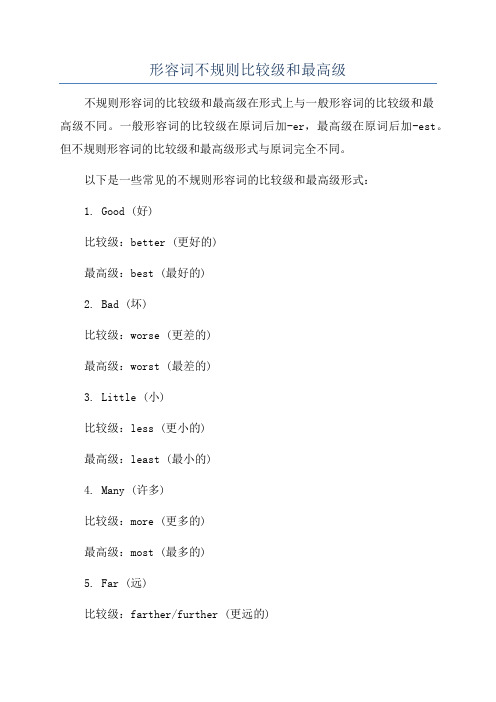
形容词不规则比较级和最高级
不规则形容词的比较级和最高级在形式上与一般形容词的比较级和最
高级不同。
一般形容词的比较级在原词后加-er,最高级在原词后加-est。
但不规则形容词的比较级和最高级形式与原词完全不同。
以下是一些常见的不规则形容词的比较级和最高级形式:
1. Good (好)
比较级:better (更好的)
最高级:best (最好的)
2. Bad (坏)
比较级:worse (更差的)
最高级:worst (最差的)
3. Little (小)
比较级:less (更小的)
最高级:least (最小的)
4. Many (许多)
比较级:more (更多的)
最高级:most (最多的)
5. Far (远)
比较级:farther/further (更远的)
最高级:farthest/furthest (最远的)
6. Old (老)
比较级:older/elder (更老的,elder通常用于年长的人或物)
最高级:oldest/eldest (最老的,eldest通常用于兄弟姐妹中最年长的人)
7. Late (迟)
比较级:later (更迟的)
最高级:latest (最迟的)
8. Near (近)
比较级:nearer (更近的)
最高级:nearest (最近的)
这些不规则形容词的比较级和最高级形式在日常口语和写作中经常使用。
需要注意的是,每个不规则形容词的比较级和最高级都有其特殊的形式,无法通过简单地在原词后加字母来形成。
因此,记住这些特殊形式是十分重要的。
常用形容词及比较级

学英语形容词比较级顺口溜比较级是形容词,一好一坏要记牢,good更好是better,bad更坏是worse结尾有e只加r,nice加r变nicer;双写目前有5个,bigger,fatter,hotter,sadder和thinner其余全部加er。
小学英语常见形容词及比较级变化一览表1.在形容词词尾加上“er”“构成比较级:cheap(便宜的)—cheaper clean(干净的)—cleanerclever(聪明的)—cleverer cold(寒冷的)—coldercool(凉的)—cooler dark(黑暗的)—darkerfast(迅速的)—faster great(伟大的)—greaterhard(困难的,硬的)—harder low(低的)—lowerhigh(高的)—higher kind(善良的)—kinderlight(轻的)—lighter long(长的)—longernear(近的)—nearer new(新的)—newerquiet(安静的)—quieter rich(富裕的)—richershort(短的)—shorter slow(慢的)—slowersmall(小的)—smaller smart(聪明的)—smarterstrong(强壮的)—stronger sweet(甜的)—sweetertall(高的)-taller young(年轻的)—younger2.双写最后一个字母,再加上“er”构成比较级:big(大的)—bigger fat(胖的)—fatterhot(热的)—hotter sad(伤心的)—sadderthin(瘦的)—thinner3.以不发音的字母e结尾的形容词,加上“r”构成比较级:close(接近的)—closer fine(好的,完美的)—finer large(巨大的)—larger late(迟的)—laternice(好的)—nicer white(白的)—whiter4.以字母y结尾的形容词,把y改为i,再加上“er”构成比较级:busy(忙碌的)—busier dirty(脏的)—dirtierearly(早的)—earlier easy(容易的)—easierfriendly(友好的)—friendlier pretty(美丽的)—prettier funny(好玩的)—funnier happy(开心的)—happier healthy(健康的)—healthier heavy(重的)—heavierhungry(饿的)—hungrier lazy(懒惰的)—lazierlucky(幸运的)—luckier noisy(嘈杂的)—noisier 5.双音节、多音节形容词,在单词前面加上“more”构成比较级:afraid(害怕的)—more afraidbeautiful(美丽的)—more beautifulcareful(仔细的)—more carefuldelicious(美味的)—more deliciousexciting(令人兴奋的)—more excitingexpensive(昂贵的)—more expensivefamous(著名的)—more famoushard-working(勤奋的)—more hard-workinghelpful(有帮助的)—more helpfulinteresting(有趣的)—more interestingpolite(有礼貌的)—more politetired(累的)—more tired6.不规则变化的形容词:bad(坏的)—worse far(远的)—farthergood(好的)—better ill(病的)—worselittle(少的)—less many(多的)—moremuch(多的)—more well(好的,身体好的)—better old(年老的)—older(elder)。
中考英语常见副词形容词比较级最高级单词归纳总结

中考英语常见副词形容词比较级最高级单词归纳总结一、目录1.中考英语常见副词形容词比较级最高级单词归纳总结2.不规则变化词比较级最高级3.特殊用法比较级最高级4.常用句型总结5.易混淆词汇辨析6.语法考点解析二、中考英语常见副词形容词比较级最高级单词归纳总结1.副词比较级最高级:more,most;less,least;fairly,quite;hardly,scarcely;again,once more;fast,faster,fastest;early,earlier,earliest;high,higher,highest;late,later,latest;near,nearer,nearest等。
2.形容词比较级最高级:big,bigger,biggest;small,smaller,smallest;hot,hotter,hottest;red,redder,reddest;beautiful,more beautiful,most beautiful等。
3.不规则变化词比较级最高级:good,better,best;badly,worse,worst;many,more,most等。
4.特殊用法比较级最高级:as...as中间用形容词或副词原级;the+比较级+ofthe two/in the pair表示两者中比较...的一个;the+序数词+比较级表示第几...等。
三、常用句型总结1.The+比较级...,the+比较级...越...越...2.比较级+than+any other+单数名词/any of+复数名词/any+单数名词表示最高级的含义。
3.比较级+than+the other+单数名词/the other+复数名词表示比较级的含义。
4.比较级+than+同一主语的其他动词表示比较级的含义。
5.The+比较级+主语+谓语表示比较级的特殊用法。
四、易混淆词汇辨析1.more和many的区别:more修饰可数名词复数或不可数名词,表示更多;many修饰可数名词复数。
- 1、下载文档前请自行甄别文档内容的完整性,平台不提供额外的编辑、内容补充、找答案等附加服务。
- 2、"仅部分预览"的文档,不可在线预览部分如存在完整性等问题,可反馈申请退款(可完整预览的文档不适用该条件!)。
- 3、如文档侵犯您的权益,请联系客服反馈,我们会尽快为您处理(人工客服工作时间:9:00-18:30)。
比较级的用法:(一)当两个人或事物(A和B)进行比较时,我们需要用到形容词(副词)的原级或者比级1.表达“A和B一样”,用as…as的结构。
公式: A+be动词+as+形容词原级+as…+BA+实义动词+as+副词原级+as…+BEg : I am as tall as you.我和你一样高He runs as fast as I. 他跑得和我一样快。
2.表达“A不如B”用not as…as的结构。
公式: A+be动词+not+as+形容词原级+as…+BA+助动词+not+动词+as+形容词原级+as…+BEg I am not as tall as you.我没有你高。
He doesn’t run as fast as I. 他没有我跑得快。
2.表达“A大于B”用“比较级+than”的结构。
公式: A+be动词+形容词比较级+than+B…Eg I am taller than you.我比你高。
He runs faster than I. 他跑得比我快。
(二)关于形容词比较级的更多用法1.比较级前面可以加上表示“优劣程度”的词或短语,意思是“更…”,“…得…”。
常见词有much许多,大量 a little,一点儿,少量, even甚至, a lot许多, a great deal大量等。
Eg He is much taller than I.他比我要高得多。
I jump a little higher than he.我跳得比他高一点点。
2.比较级前面可以加上表示具体数量差别的结构,表示具体“大多少”,“小多少”,“长多少”,“短多少”等。
Eg I am two years older than he.我比他大两岁。
This building is 20 meters higher than that one.这个建筑物比那个建筑高20 米。
3.“比较级+and+比较级”表示“越来越……”。
It is getting warmer and warmer.天气越来越暖和。
He is running faster and faster.他跑得越来越快。
0ur country is becoming more and more beautiful.我们祖国越来越美了。
4.“the more…,the more…”表示“越……,就越……”,The more,the better.多多益善。
The more careful you are, the fewer mistakes you will make.你越细心,犯错就越少。
四、当三个或三个以上的人或事物进行比较时,我们需要用到形容词的最高级1.表达“…是…中最…的”,用“the+形容词的最高级+in/of /among +范围”的结构。
Eg.He is the tallest (student) in our class. 他是我们班最好的学生之一。
The roses are the most beautiful followers of all the followers. 玫瑰是最美丽的追随者的追随者2.表示“最…的…中一个”,用“one of +the +最高级+复数名词”的结构来表达。
Eg He is one of the best students in our class.他是我们班最好的学生之一。
This is one of the most beautiful flowers in the garden.这是花园里最漂亮的花之一。
注意:(一) 形容词的最高级前面有定冠词the,但在形容词最高级前有物主代词(my /mine等)时,不能要定冠词the.五、运用形容词比较级应当注意的问题:(一)、只有同类的事物才能比较e.g Her bag is bigger than mine. 她的包比我的更大。
不能说Her bag is bigger than I. 她的包比我大。
The weather of Kunming is much better than that of Shenyang.昆明的天气比沈阳的要好得多。
不能说The weather of Kunming is much better than Shenyang.昆明的天气比沈阳好得多。
(二)、如果比较对象相同,可用that/those代替第二个比较对象,如:The texts in Book One are much better than those in Book Two.书中的课文比第二册的好得多。
英语常见形容词及比较级、最高级变化一览表1.在形容词词尾加上“er”“est”构成比较级、最高级:bright(明亮的)—brighter—brightest broad(广阔的)—broader—broadest cheap(便宜的)—cheaper—cheapest cool(凉的)—cooler—coolestclean(干净的)—cleaner—cleanest dark(黑暗的)—darker—darkestclever(聪明的)—cleverer—cleverest low(低的)—lower—lowestcold(寒冷的)—colder—coldest dark(黑暗的)—darker—darkestdear(贵的)—dearer—dearest deep(深的)—deeper—deepestfast(迅速的)—faster—fastest few(少的)—fewer—fewestgreat(伟大的)—greater—greatest hard(困难的,硬的)—harder—hardest high(高的)—higher—highest kind(善良的)—kinder—kindest light(轻的)—lighter—lightest long(长的)—longer—longestloud(响亮的)—louder—loudest near(近的)—nearer—nearest new(新的)—newer—newest poor(穷的)—poorer—poorest quick(快的)—quicker—quickest quiet(安静的)—quieter—quietest rich(富裕的)—richer—richest short(短的)—shorter—shortest slow(慢的)—slower—slowestsmall(小的)—smaller—smallest smart(聪明的)—smarter—smartest soft(柔软的)—softer—softest strong(强壮的)—stronger—strongestsweet(甜的)—sweeter—sweetest tall(高的)-taller-tallestthick(厚的)—thicker—thickest warm(温暖的)—warmer—warmestweak(弱的)—weaker—weakest young(年轻的)—younger—youngest 2.双写最后一个字母,再加上“er”“est”构成比较级、最高级:big(大的)—bigger—biggest fat(胖的)—fatter—fattesthot(热的)—hotter—hottest red(红的)—redder—reddestsad(伤心的)—sadder—saddest thin(瘦的)—thinner—thinnestwet(湿的)—wetter—wettest mad(疯的)—madder —maddest3.以不发音的字母e结尾的形容词,加上“r”“st”构成比较级、最高级:able(能干的)—abler—ablest brave(勇敢的)—braver—bravestclose(接近的)—closer—closest fine(好的,完美的)—finer—finest large(巨大的)—larger—largest late(迟的)—later—latestnice(好的)—nicer—nicest ripe(成熟的)—riper—ripestrude(粗鲁的)—ruder—rudest safe(安全的)—safer—safest strange(奇怪的)—stranger—strangest wide(宽广的)—wider—widestwise(睿智的,聪明的)—wiser—wisest white(白的)—whiter—whitest4.以字母y结尾的形容词,把y改为i,再加上“er”“est”构成比较级、最高级:busy(忙碌的)—busier—busiest dirty(脏的)—dirtier—dirtiestdry(干燥的)—drier—driest early(早的)—earlier—earliesteasy(容易的)—easier—easiest friendly(友好的)—friendlier—friendliest funny(好玩的)—funnier—funniest happy(开心的)—happier—happiesthealthy(健康的)—healthier—healthiest heavy(重的)—heavier—heaviest hungry(饿的)—hungrier—hungriest lazy(懒惰的)—lazier—laziestlucky(幸运的)—luckier—luckiest naughty(调皮的)—naughtier—naughtiest noisy(嘈杂的)—noisier—noisiest pretty(美丽的)—prettier—prettiestsilly(傻的)—sillier—silliest spicy(辣的)—spicier—spiciestthirsty(渴的)—thirstier—thirstiest ugly(丑的)—uglier—ugliest5.双音节、多音节形容词,在单词前面加上“more”“most”构成比较级、最高级:afraid(害怕的)—more afraid—most afraidbeautiful(美丽的)—more beautiful—most beautifulcareful(仔细的)—more careful—most carefulcheerful(开心的)—more cheerful—most cheerfulcrowded(拥挤的)—more crowded—most crowdeddangerous(危险的)—more dangerous—most dangerousdelicious(美味的)—more delicious—most deliciousdifficult(困难的)—more difficult—most difficultexciting(令人兴奋的)—more exciting—most excitingexpensive(昂贵的)—more expensive—most expensivefamous(著名的)—more famous—most famousfrightened(受惊的)—more frightened—most frightenedfrightening(令人害怕的)—more frightening—most frighteninghard-working(勤奋的)—more hard-working—most hard-workinghelpful(有帮助的)—more helpful—most helpfulhonest(诚实的)—more honest—most honestimportant(重要的)—more important—most importantinteresting(有趣的)—more interesting—most interestingpolite(有礼貌的)—more polite—most politeterrible(可怕的)—more terrible—most terribletired(累的)—more tired—most tired6.不规则变化的形容词:bad(坏的)—worse—worstfar(远的)—farther—farthest (far—further—furthest)good(好的)—better—best ill(病的)—worse—worst little(少的)—less—least many(多的)—more—most much(多的)—more—mostold(年老的)—older—oldest ( old—elder—eldest)well(好的,身体好的)—better—best【语法专项练习题】1、That boy looks as _____ as a boxer.A. strongB. strongerC. strongestD. more strong2.Then Summer Palace is______ than Zhong Shan park.A. bigerB. more bigC. the biggestD. bigger3.Which do you like_____, apples or oranges?A. goodB. betterC. bestD. well4、--Oh, the food is bad.--I think so .And the service(服务) is __________.A.the worstB. worseC. badderD. the worse5、--You are the same coat as I.--Yes, Mine is _____, but not so____ as yours.A. better, expensiveB. better, more expensiveC. much better, more expensiveD. good, more expensive6、The experts think that India’s population may be ________than China’s ____2020.A. much, byB. more, inC. larger, byD. large r, on7、This year our school is ______ than it was last year.A. much beautifulB. the most beautifulC. beautifulerD. much more beautiful8、____you work, _____knowledge you will get.A. The harder, moreB. The harder, the moreC. Harder,the more D. Harder, more9、He has____friends than I.A. much moreB. many moreC. very moreD. too m ore10、Shanghai is larger than ____city in China.A. anyB. any otherC. the othersD. any else11、The population of China is larger than ____ .A. AmericaB. the one of AmericasC. that of AmericaD. Americans12、Which is ____________clothing store in your town?A. the bestB. the betterC. the most goodD. best13、My sister is ____________person I know.A. the funniestB. the funnierC.the most funD. funniest14、He is ________more beautiful than I.A. tooB. enoughC. muchD. very15.The book is the _______one in the bookshop.A.the most cheap B.the expensiveC.the most expensiveD.the less expensiver16、I have _______ apples and ______milk than you.A. many, littleB. more, lessC. more, leastD. many, less17.You should study English hard, because it’s getting______ in ourcountry . A. more and more important B. more important and more importantC. importanter and importanterD. important and important18、Her brother is __________than she.A. 7 year olderB. 7 year oldC. 7 years oldD. 7 years older。
